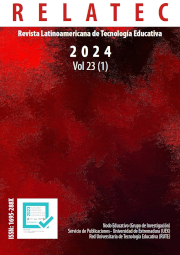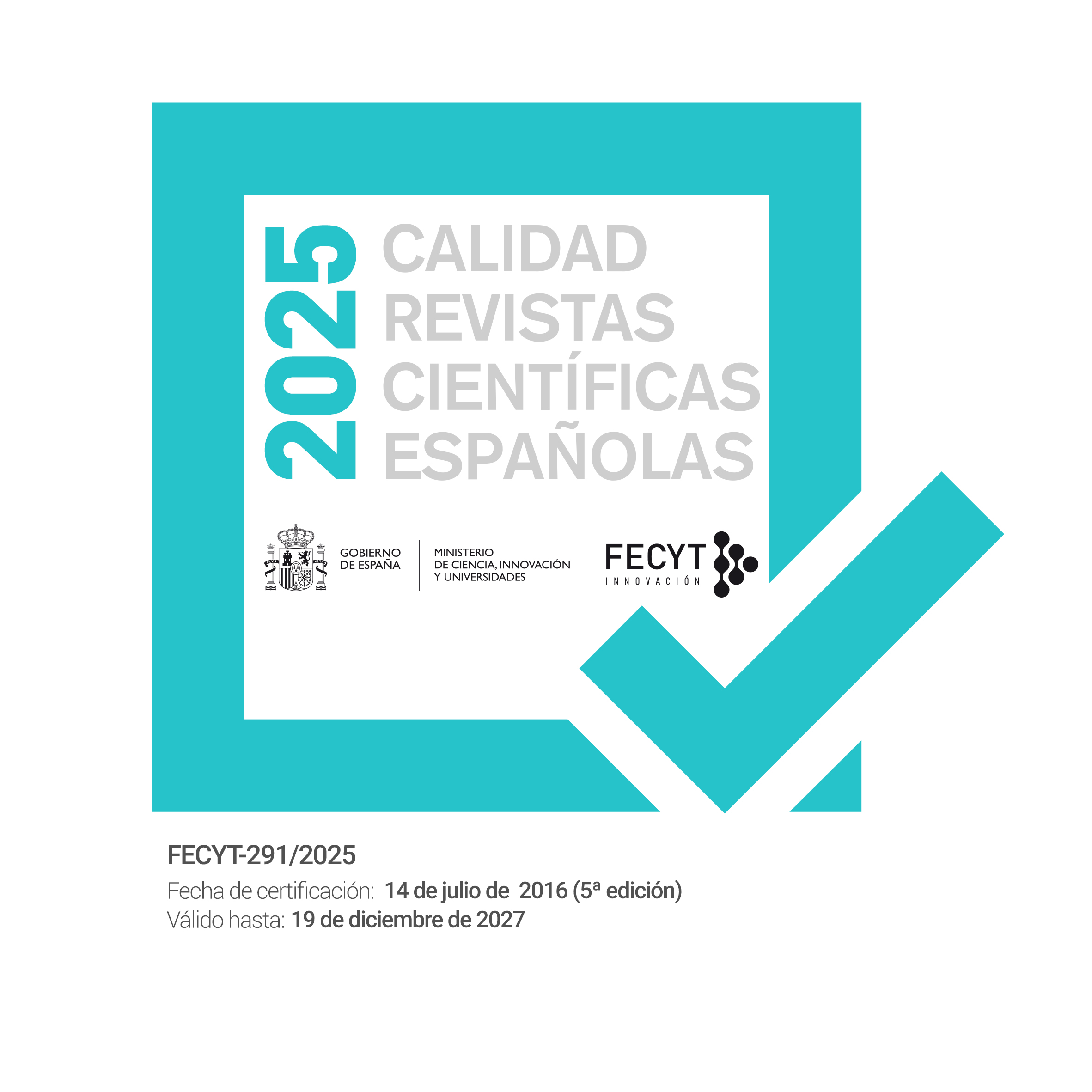Percepciones de maestros en prácticas sobre aceptación de tecnologías móviles en procesos de enseñanza-aprendizaje. Un estudio de caso
DOI:
https://doi.org/10.17398/1695-288X.23.1.81Palabras clave:
Enseñanza Móvil, Maestros en prácticas, investigación cualitativa, Grupo Focal, Dispostivo movil inteligenteResumen
La crisis pandémica evidenció la necesidad de una transformación tecnológica y digital de la universidad, proceso ya iniciado y que ha supuesto un antes y un después en la incorporación de las tecnologías en los procesos de enseñanza-aprendizaje. Por otro lado, los maestros en prácticas suponen un colectivo privilegiado en tanto que se hallan al final de su proceso formativo, en contacto con docentes en activo y serán pilares de la formación social. Por ello, este estudio pretende analizar las percepciones de los maestros en prácticas de la Universidad de Granada, sobre la aceptación e inclusión de smartphones en los procesos de enseñanza-aprendizaje, a raíz de la crisis pandémica de la Covid-19. Se implementó una metodología cualitativa (focus group) con una muestra de 16 maestros en prácticas perteneciente al área de ciencias sociales. Los resultados mostraron una incorporación de las tecnologías en futuros docentes, la necesidad de implementación de smartphones así como la alfabetización móvil de estudiantes y profesores. Del mismo modo, se subrayan diferencias generacionales, la relevancia de la motivación y de la percepción en utilidad y facilidad de uso de los dispositivos. Se concluye la necesidad de acciones formativa en docentes y centros educativos para dar una respuesta eficaz a las necesidades sociales y educacionales. Por ello, la universidad, instituciones educativas y maestros, deben esforzarse por comprender el alcance de la enseñanza móvil y las posibilidades de los smartphones en el incremento de la motivación y la adquisición de competencias básicas. Se precisa realizar estudios futuros que amplíen el ámbito de análisis a distintas áreas y contextos.
Descargas
Referencias
Adov, L., Pedaste, M., Leijen, Ä., & Rannikmäe, M. (2020). Does it have to be easy, useful, or do we need something else? STEM teachers’ attitudes towards mobile device use in teaching. Technology, pedagogy and education, 29(4), 511-526. https://doi.org/10.1080/1475939X.2020.1785928
Al-Emran, M., Mezhuyev, V., & Kamaludin, A. (2020). Towards a conceptual model for examining the impact of knowledge management factors on mobile learning acceptance. Technology in Society, 61, 101247. https://doi: 10.1016/j.techsoc.2020.101247
Al-Rahmi, A. M., Al-Rahmi, W. M., Alturki, U., Aldraiweesh, A., Almutairy, S., & Al-Adwan, A. S. (2022). Acceptance of mobile technologies and M-learning by university students: An empirical investigation in higher education. Education and Information Technologies, 27(6), 7805-7826. http://dx.doi.org/10.1007/s10639-022-10934-8
Alubthane, F., & ALYoussef, I. (2021). Pre-Service Teachers' Views about Effective Use of the Whatsapp Application in Online Classrooms. Turkish Online Journal of Educational Technology-TOJET, 20(1), 44-52.
Annamalai, N. (2018). How Do We Know What is Happening in Whatsapp: A Case Study Investigating Pre-Service Teachers’ Online Activity. Malaysian Journal of Learning and Instruction, 15(2), 207-225.http://dx.doi.org/10.32890/mjli2018.15.2.8
Aharony, N., & Gur, H. (2019). The relationships between personality, perceptual, cognitive and technological variables and students’ level of information literacy. Journal of Librarianship and Information Science, 51(2), 527-544.https://doi.org/10.1177/0961000617742450
Ata, R., & Cevik, M. (2019). Exploring relationships between Kolb’s learning styles and mobile learning readiness of pre-service teachers: A mixed study. Education and Information Technologies, 24(2), 1351-1377.https://link.springer.com/article/10.1007/s10639-018-9835-y
Batch, B., Roberts, J., Nakonechnyi, A., & Allen, R. (2021). «Cell Phones Under the Table”: Meeting Students’ Needs to Reduce Off-Task Smartphone Use Through Faculty–Student Collaboration. Journal of Educational Technology Systems, 49(4), 487-500.https://doi.org/10.1177/0047239520985449
Buabeng-Andoh, C. (2021). Exploring University students’ intention to use mobile learning: A research model approach. Education and information technologies, 26(1), 241-256.https://doi.org/10.1007/s10639-020-10267-4
Camilleri, M. A., & Camilleri, A. C. (2022). Learning from anywhere, anytime: Utilitarian motivations and facilitating conditions for mobile learning. Technology, Knowledge and Learning, 1-19. https://doi.org/10.1007/s10758-022-09608-8
Chahal, J., & Rani, N. (2022). Exploring the acceptance for e learning among higher education students in India: combining technology acceptance model with external variables. Journal of Computing in Higher Education, 1, 1-24. .http://dx.doi.org/10.1007/s12528-022-09327-0
Chen, C. H., & Tsai, C. C. (2021). In-service teachers' conceptions of mobile technology-integrated instruction: Tendency towards student-centered learning. Computers & Education, 170, 104224.https://doi.org/10.1016/j.compedu.2021.104224
Davis, F. D. (1989). Perceived usefulness, perceived ease of use, and user acceptance of information technology. MIS Quarterly, 13(3), 319-340. http://dx.doi.org/10.2307/249008
García-Martínez, I., Fernández-Batanero, J. M., Cobos Sanchiz, D., & Luque de La Rosa, A. (2019). Using mobile devices for improving learning outcomes and teachers’ professionalization. Sustainability, 11(24), 6917.https://doi.org/10.3390/su11246917
Gunawana, Y. L., & Danielb, D. R. (2020). The Development of an Online Job Marketing Information System: A Case Study of Accounting Graduates. Development, 11(9). https://doi.org/10.3727/109830508785059020
Habes, M., Elareshi, M., Salloum, S. A., Ali, S., Alfaisal, R., Ziani, A., & Alsridi, H. (2022). Students’ perceptions of mobile learning technology acceptance during Covid-19: WhatsApp in focus. Educational Media International, 59(4), 288-306. http://dx.doi.org/10.1080/09523987.2022.2153990
Hafour, M. (2022). The effects of MALL training on preservice and in-service EFL teachers’ perceptions and use of mobile technology. ReCALL, 34(3), 274-290. doi:10.1017/S0958344022000015
Hamidi, H., & Chavoshi, A. (2018). Analysis of the essential factors for the adoption of mobile learning in higher education: A case study of students of the University of Technology. Telematics and Informatics, 35(4), 1053-1070.https://doi.org/10.1016/j.tele.2017.09.016
Hsu, H. H., & Chang, Y. Y. (2013). Extended TAM model: Impacts of convenience on acceptance and use of Moodle. Online Submission, 3(4), 211-218. http://doi.org/ 10.12691/ajnr-5-6-7
Kearney, M., & Maher, D. (2019). Mobile learning in pre-service teacher education: Examining the use of professional learning networks. Australasian Journal of Educational Technology, 35(1), 135.148, https://doi.org/10.14742/AJET.4073
Krouska, A., Troussas, C., & Sgouropoulou, C. (2022). Mobile game-based learning as a solution in COVID-19 era: Modeling the pedagogical affordance and student interactions. Education and Information Technologies, 27(1), 229-241.https://doi.org/10.1007/s10639-021-10672-3
Kumar, J. A., Bervell, B., Annamalai, N., & Osman, S. (2020). Behavioral intention to use mobile learning: Evaluating the role of self-efficacy, subjective norm, and WhatsApp use habit. IEEE Access, 8208058-208074.https://doi.org/10.1109/ACCESS.2020.3037925
Latham, D., Gross, M., & Witte, S. (2013). Preparing teachers and librarians to collaborate to teach 21st century skills: Views of LIS and education faculty. School Library Research, 16, 2165-1019. https://doi.org/10.5860/crl-343
Nikou, S. A., & Economides, A. A. (2017). Mobile-Based Assessment: Integrating acceptance and motivational factors into a combined model of Self-Determination Theory and Technology Acceptance. Computers in Human Behavior, 68, 83-95. https://doi.org/10.1016/j.chb.2016.11.020
Park, H., Kim, H. S., & Park, H. W. (2021). A scientometric study of digital literacy, ICT literacy, information literacy, and media literacy. Journal of Data and Information Science, 6(2), 116-138. https://doi.org/10.2478/jdis-2021-0001
Pinto, M., Caballero-Mariscal, D. ,& Segura, A. (2021). Experiences of information literacy and mobile technologies amongst undergraduates in times of COVID. A qualitative approach. Aslib Journal of Information Management, 74, 181-201. https://doi.org/10.1108/ajim-10-2020-0333
Rosli, M. S., Saleh, N. S., Md. Ali, A., Abu Bakar, S., & Mohd Tahir, L. (2022). A Systematic review of the technology acceptance model for the sustainability of higher education during the COVID-19 pandemic and identified research gaps. Sustainability, 14(18), 11389. https://doi.org/10.3390/su141811389
Sánchez-Prieto, J. C., Olmos-Migueláñez, S., & García-Peñalvo, F. J. (2019). Informal tools in formal contexts: Development of a model to assess the acceptance of mobile technologies among teachers. Computers in Human Behavior, 55, 519-528.https://doi.org/10.1016/j.chb.2015.07.002
Sitar-Taut, D. A., & Mican, D. (2021). Mobile learning acceptance and use in higher education during social distancing circumstances: an expansion and customization of UTAUT2. Online Information Review, 45(5), 1000-1019. https://doi.org/10.1002/hbe2.261
Trninić, D., Kuprešanin Vukelić, A., & Bokan, J. (2021). Perception of «Fake News»and Potentially Manipulative Content in Digital Media—A Generational Approach. Societies, 12(1), 3-24. https://doi.org/10.3390/soc12010003
Valtonen, T., Hoang, N., Sointu, E., Näykki, P., Virtanen, A., Pöysä-Tarhonen, J. ...& Kukkonen, J. (2021). How pre-service teachers perceive their 21st-century skills and dispositions: A longitudinal perspective. Computers in Human Behavior, 116, 106643. https://doi.org/10.1016/j.chb.2020.106643
Walker, Z., Kho, H. H., Tan, D., & Lim, N. (2020). Practicum teachers’ use of mobile technology as measured by the technology acceptance model. Asia Pacific Journal of Education, 40(2), 230-246. https://doi.org/10.1080/02188791.2019.1671808
Wali, A., & Omaid, M. (2020). The use of smartphones as an educational tool in the classroom: Lecturers’ perceptions. International Journal of Emerging Technologies in Learning (IJET), 15(16), 238-247.https://doi.org/10.3991/ijet.v15i16.14179%0d
Wong, L. W., Tan, G. W. H., Hew, J. J., Ooi, K. B., & Leong, L. Y. (2022). Mobile social media marketing: a new marketing channel among digital natives in higher education?. Journal of Marketing for Higher Education, 32(1), 113-137.https://doi.org/10.1016/j.ijinfomgt.2019.08.005
Zhonggen, Y., & Xiaozhi, Y. (2019). An extended technology acceptance model of a mobile learning technology. Computer Applications in Engineering Education, 27(3), 721-732. http://dx.doi.org/10.1002/cae.22111
Descargas
Publicado
Número
Sección
Licencia
Derechos de autor 2024 David Caballero-Mariscal

Esta obra está bajo una licencia internacional Creative Commons Atribución-NoComercial-SinDerivadas 4.0.
Los autores/as que publiquen en esta revista aceptan las siguientes condiciones:
1. Los autores/as conservan los derechos de autor y ceden a la revista el derecho de la primera publicación, con el trabajo registrado con la licencia Creative Commons Reconocimiento-NoComercial-SinObraDerivada 4.0 International (CC BY-NC-ND), que permite a terceros utilizar lo publicado siempre que mencionen la autoría del trabajo y a la primera publicación en esta revista.
2. Los autores/as pueden realizar otros acuerdos contractuales independientes y adicionales para la distribución no exclusiva de la versión del artículo publicado en esta revista (p. ej., incluirlo en un repositorio institucional o publicarlo en un libro) siempre que indiquen claramente que el trabajo se publicó por primera vez en esta revista.
3. Se permite y recomienda a los autores/as a publicar su trabajo en Internet (por ejemplo en páginas institucionales o personales) antes y durante el proceso de revisión y publicación, ya que puede conducir a intercambios productivos y a una mayor y más rápida difusión del trabajo publicado (vea The Effect of Open Access).









